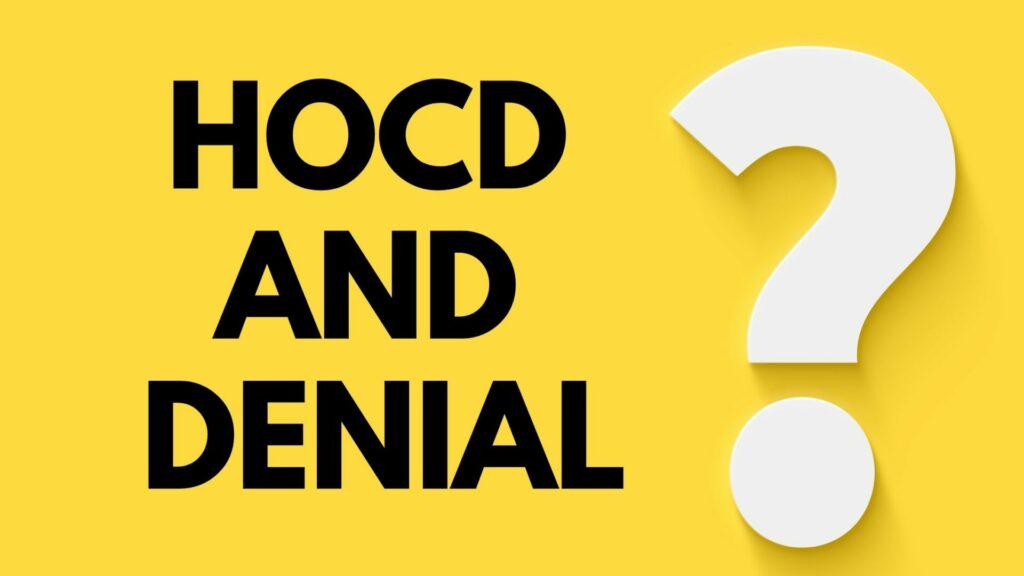There’s a lot of confusion out there about the difference between HOCD and denial. Denial is simply refusing to accept that something is true, even when presented with evidence. HOCD, on the other hand, is obsessional thinking about whether or not you are gay, even when you are 100% sure that you are not. In this article, we will learn about what alone these terms are, the similarities and differences between HOCD And Denial
Contents
What is HOCD?
 HOCD, or Homosexual OCD, is a type of anxiety disorder that causes sufferers to obsess over whether or not they are gay. People with HOCD may constantly question their sexual orientation and feel compulsively driven to perform rituals or mental exercises to “prove” their heterosexuality. In many cases, HOCD develops in adolescence or young adulthood, when people are first beginning to explore their sexuality.
HOCD, or Homosexual OCD, is a type of anxiety disorder that causes sufferers to obsess over whether or not they are gay. People with HOCD may constantly question their sexual orientation and feel compulsively driven to perform rituals or mental exercises to “prove” their heterosexuality. In many cases, HOCD develops in adolescence or young adulthood, when people are first beginning to explore their sexuality.
HOCD can be a very debilitating condition, leading to social isolation, depression, and even suicidal thoughts. If you think you might be suffering from HOCD, it’s important to seek professional help. Cognitive-behavioral therapy (CBT) is an effective treatment for HOCD and can help you learn to manage your anxiety and live a full life.
What is Denial?
 Most of us have heard the term “in denial” used before, but what does it mean? Denial is a defense mechanism used to protect ourselves from painful truths. It’s a way of saying, “I can’t deal with this right now, so I’m going to pretend it’s not happening.”
Most of us have heard the term “in denial” used before, but what does it mean? Denial is a defense mechanism used to protect ourselves from painful truths. It’s a way of saying, “I can’t deal with this right now, so I’m going to pretend it’s not happening.”
For example, let’s say you just found out your spouse is cheating on you. The pain and betrayal you feel are overwhelming. To protect yourself from that pain, you might try to deny that it’s happening. You might tell yourself things like, “It’s not true. They would never do that to me. This is just a phase they’re going through.”
Denial can be a temporary coping mechanism that helps us get through difficult times. But for some people, denial becomes a permanent way of life. They continue to deny even when the evidence is staring them in the face.
If you think you might be in denial about something in your life, ask yourself these questions:
– Am I avoiding the issue?
– AmI pretending it’s not happening?
– Am I refusing to face the facts?
– Am I denying my feelings about the situation?
If you answered “yes” to any of these questions, then you might be in denial. Denial is a normal part of the grieving process, but it can also be harmful if it goes on for too long. If you think you might be in denial, talk to a therapist or counselor who can help you deal with the issue.
The Difference Between HOCD and Denial

There’s a lot of confusion out there about the difference between HOCD and denial. Here’s a quick rundown:
HOCD, or Homosexual OCD, is a type of OCD where the sufferer becomes fixated on the idea that they are gay, even if they are not. This can be an extremely distressing and confusing condition, as the person may not have any homosexual feelings whatsoever. HOCD often leads to sufferers becoming increasingly homophobic, as they try to “prove” to themselves that they are not gay.
Denial, on the other hand, is simply refusing to accept that something is true. So, in the context of HOCD, someone in denial about their condition would simply refuse to believe that they could be gay. They would deny any evidence to the contrary, no matter how strong it may be.
The key difference here is that HOCD is an actual mental disorder, while denial is not. Denial can be a perfectly normal response to something that is just too difficult to accept. But when denial starts to interfere with your life and wellbeing, that’s when it becomes a problem.
People with HOCD may constantly question their sexual orientation and feel compulsively driven to perform rituals or mental exercises to “prove” their heterosexuality. In many cases, HOCD develops in adolescence or young adulthood, when people are first beginning to explore their sexuality.
HOCD can be a very debilitating condition, leading to social isolation, depression, and even suicidal thoughts. If you think you might be suffering from HOCD, it’s important to seek professional help. Cognitive-behavioral therapy (CBT) is an effective treatment for HOCD and can help you learn to manage your anxiety and live a full life.
Similarities Between HOCD And Denial

There are a few key similarities between HOCD and denial. Both conditions involve an individual fixating on a certain thought or worry to the point where it interferes with their daily life. For someone with HOCD, this may be a fear that they are gay or lesbian, even if they have no prior experience or attraction to the same sex.
Someone in denial may be obsessively thinking about a traumatic event they experienced, even if they don’t want to think about it or don’t want to admit it happened. In both cases, the individual is likely to avoid anything that might trigger their thoughts or feelings related to the obsession.
They may also try to compulsively engage in activities that counter the obsessions, such as straight men who overcompensate by watching hetero porn or avoiding all contact with members of the same sex.
Causes of HOCD and Denial
There are many potential causes of HOCD and Denial. Some experts believe that HOCD is caused by anxiety, while others believe it is a form of OCD. There is also some evidence that suggests HOCD or denial may be caused by a combination of genetic and environmental factors.
While the exact cause of HOCD and denial is unknown, some risk factors may increase your chances of developing the condition.
These include having a family history of OCD or anxiety, being under a lot of stress, or have experienced trauma or abuse. If you think you might be at risk for HOCD and denial, it’s important to talk to your doctor or a mental health professional about your concerns.
Treatment for HOCD and Denial

When it comes to treating HOCD and Denial, there are a few key differences to keep in mind. Denial is often treated with cognitive behavioral therapy, which helps patients to change their thinking patterns and behaviors.
This can be an effective treatment for patients who can identify their negative thoughts and work to change them. HOCD, on the other hand, is often treated with medication. This is because HOCD is thought to be caused by a chemical imbalance in the brain, and medication can help to correct this imbalance.
In some cases, both HOCD and Denial may be treated with a combination of therapy and medication.
How to Cope With HOCD or Denial?
If you think you may have HOCD or denial, it is important to remember that you are not alone. Many people suffer from this condition, and there are ways to cope with it. Here are some tips:
- Talk to someone who can help you understand your feelings and work through them. This may be a therapist or your family member.
- Avoid triggers that may cause anxiety or distress. This may include avoiding certain types of media or situations that remind you of your fears.
- Challenge your negative thoughts about yourself. For instance, if you think, “I’m a terrible person because I’m gay,” try to reframe that thought as, “There is nothing wrong with being gay.”
- Practice relaxation techniques such as deep breathing or meditation to help reduce stress and anxiety.
Conclusion
There are a lot of similarities between HOCD and denial, which can make it difficult to tell the two apart. Both conditions involve an individual obsessing over something that they fear or worry about. Also, both can lead to avoidance behaviors. However, there are some key differences between the two conditions. Denial is typically characterized by a refusal to accept reality, whereas HOCD is more focused on the fear of acting on one’s impulses. Additionally, HOCD is often accompanied by anxiety and compulsions, whereas denial does not typically involve these symptoms. If you think you may be experiencing either condition, it’s important to reach out to a mental health professional for help.
Hope this article was of help to you! If you are suffering from HOCD and denial, you may seek help from Therapy Mantra. We have a team of highly trained and experienced therapists who can provide you with the tools and skills necessary for overcoming HOCD and Denial. Contact us today to schedule an online therapy or download our free OCD treatment app on Android or iOS for more information.


